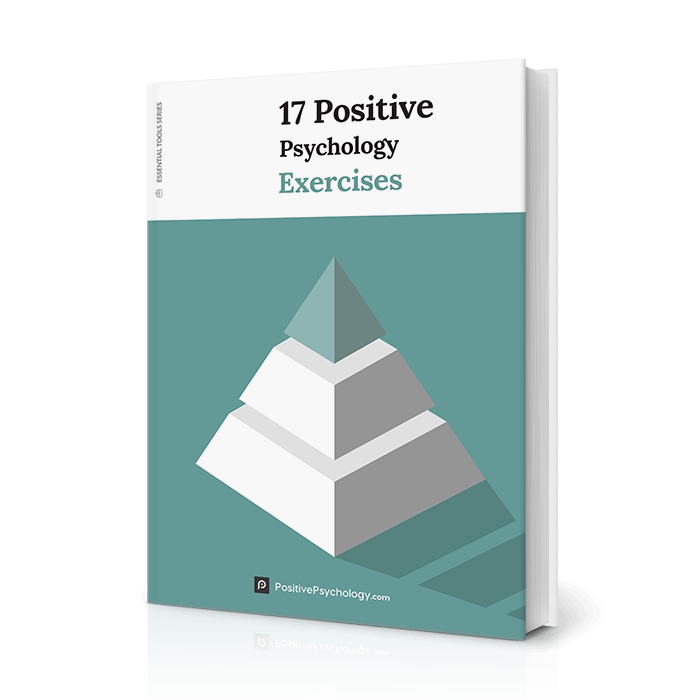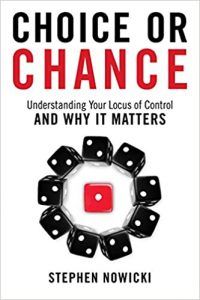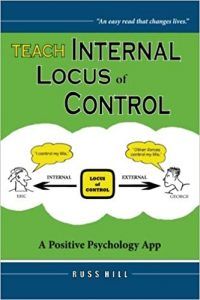Internal vs External Locus of Control: 7 Examples & Theories
 How much control do we really have over our lives?
How much control do we really have over our lives?
Many psychological theories have attempted to answer this question. One such explanation is the locus of control.
Locus of control is a concept created by psychologist Julian Rotter (1954). Rotter was interested in social learning and why some behaviors stick while others languish.
Locus of control is an underlying structure of Rotter’s social learning theory, but as a standalone theory, it has had significant applications in education, health, and clinical psychology. It has driven research in motivation, learning, depression, and addiction.
In this article, we look at the research into locus of control and offer seven worksheets and two recommended books to provide a comprehensive overview of this topic.
Before you continue, we thought you might like to download our three Positive Psychology Exercises for free. These science-based exercises will explore fundamental aspects of positive psychology including strengths, values, and self-compassion, and will give you the tools to enhance the wellbeing of your clients, students, or employees.
This Article Contains:
What Is the Locus of Control in Psychology?
The concept behind locus of control is fairly simple. Our lives are full of actions and outcomes. Each of us will ascribe a certain locus of control over these outcomes. The theory states that we will place the location, or locus, either externally or internally.
If we place the locus of control externally, we are likely to blame the outcome on fate, luck, or happenstance. If we place the locus of control internally, we are likely to believe our own actions determine the outcome.
Rotter (1966) stated that where we place that locus will either reinforce or punish our actions. An internal locus of control will lead to a reinforcement of that behavior, and the behavior will continue. An external locus of control will cause the behavior to extinguish – why would we continue to try if the outcome is outside of our control?
However, Rotter (1975) was careful to state that we should conceptualize this as a continuum between external and internal, rather than an either/or categorization. In general, healthy adults rarely believe that everything is either entirely out of our control or entirely within it.
In fact, individuals who employ a blend of both internal and external loci in their reasoning report higher levels of happiness (April, Dharani, & Peters, 2012).
Internal vs External Locus of Control: 3 Examples

We will call these two people Isaac the Internalizer and Everett the Externalizer.
- Work
Isaac and Everett are both up for a promotion.
Isaac, with his internal locus of control, believes that his hard work will get him the promotion. He also believes that if he doesn’t get it, he just needs to work harder.
Everett, on the other hand, feels that the promotion is largely outside of his control and that external forces, whether they are just chance or the boss’s whims, will determine whether he will get the promotion. Although he may not work as hard to obtain the promotion, if he doesn’t get it, Everett may be easier on himself than Isaac.
- School
There is a big test coming up, and Isaac and Everett are at the library.
Isaac believes his score will directly reflect the amount of studying that he did, and since he wants a good grade, he applies himself and studies hard.
Everett has an external locus of control and believes that the grade may well reflect the teacher’s bias. He believes that studying too hard is a waste of time.
- Health
Isaac’s doctor tells him he has the potential to develop Type II diabetes.
Isaac has heard that it’s possible to control this outcome with diet, so he decides to cut out all sugar and try to eat more vegetables.
Everett gets the same diagnosis, but he believes that it’s all genetic. He comes from a family with a history of diabetes and feels that the outcome is inevitable. He doesn’t try to change his diet because he doesn’t think it will make any difference.
Popular Theories About the Concept
Following is a discussion of how locus of control relates to other psychological theories. Two theories that are related but differ in subtle ways include self-efficacy and attribution style.
Another important theory is personality and how it affects our locus of control. And finally, in order to stay relevant, the theory of locus of control must take into consideration cultural factors, such as how oppression and discrimination may affect our perception of control.
Self-efficacy theory
Self-efficacy, a concept proposed by Albert Bandura (2010), is the measure of how capable an individual feels about achieving their goals.
Bandura, a social psychologist, showed that no matter how talented a person may be, if they do not believe they are capable, this belief will have a strong effect on their ability to succeed. Individuals with high self-efficacy will have higher levels of persistence and give up less easily than those with low levels of self-efficacy (Schunk, 1990).
Self-efficacy and locus of control are related, but they are not the same. An individual with an internal locus of control may feel their health outcomes are caused by their behavior, but they may not feel capable of achieving their goal.
For example, a person may know that they can increase muscle mass by doing certain exercises but may feel that they won’t succeed because they don’t have the knowledge to create an exercise plan. Also, locus of control includes an appraisal of the surrounding environment, whereas self-efficacy is ultimately a self-reflective construct.
Attributional styles & locus of control
Locus of control is a theory of learning. Importantly, this means that the behavior in question, whether it’s sticking with an exercise plan or studying for a test, will either be reinforced or halted based on the perceived locus of control.
For example, if a person finds a $20 bill on the street, it is unlikely that they will continue to return to that street again and again looking for more money; instead, they perceive that the locus of control behind finding the money was an external event, namely chance.
Attributional style is also a theory of behavior that includes locus of control as one of three potential causes (Weiner, 1986). Attribution theory includes other factors – whether the cause is global or specific, stable or unstable – in addition to whether the individual perceives that they have control over it.
A global attribution means that the person believes the cause of the event is consistent across all contexts. A specific attribution is just the opposite: it only happens in a particular context. Whether an outcome is stable or unstable describes if it is consistent across time or only attributable to a single point in time.
Weiner (1986) gives the examples that ability is stable and internal, whereas mood is unstable and internal. Task difficulty may be seen as stable and external, while luck is seen as unstable and external. The perceived amount of control over each of these may vary from person to person.
Similar to locus of control, our attribution style will affect our behavior. Imagine, for example, that your brother is visiting, and he blows up at you over something small, yelling and storming out.
If you attribute his behavior to internal, stable, and global causes, you perceive that your brother’s personality causes him to act this way in all contexts and all the time. If you attribute his behavior to internal but unstable and specific causes, you may think that he is in a foul mood, that this is out of character, and something must have set him off.
Given these two appraisals of the same situation, we will behave differently. We are less likely to be forgiving if we feel the person has control over their behavior. We may be more likely to let it go if we think it’s a onetime event rather than something that happens no matter the situation.
Can you change your perception in four minutes? – Pari Majd
Locus of control & personality theories
Much of the research into locus of control and how it relates to personality has been in the realm of work satisfaction and health outcomes (Strauser, Ketz, & Keim, 2002; Spector & O’Connell, 1994).
The Big Five personality traits (emotional stability, extraversion, openness, agreeableness, and conscientiousness) have each been shown to have varying levels of impact on outcomes in these realms. These traits have been examined for their relationship with locus of control and how the interaction may affect work-life and health (Ng, Sorensen, & Eby, 2006; Boysan & Kiral, 2017; Mutlu, Balbag, & Cemrek, 2010).
In general, emotional stability (formerly known as neuroticism) and conscientiousness have strong positive relationships with an internal locus of control. Believing that their behavior contributes directly to the outcome of a situation will naturally lead to hard work if the individual also has the desire.
Conversely, those with an external locus of control have been shown to have higher levels of stress and even depression (Benassi, Sweeney, & Dufour, 1988). It stands to reason that if someone feels they are at the mercy of outside forces and their life is not in their hands, this could lead to anxiety and learned helplessness.
The idea of learned helplessness and its relationship to an external locus of control was introduced by Martin Seligman (1975).
He advanced the hypothesis that individuals with depression have a state of mind that reflects a type of helplessness, meaning that they don’t believe that their actions will have any positive effect on the outcomes of their lives. This type of thinking may reflect an external locus of control, because they have little faith in themselves (Abramson, Seligman, & Teasdale, 1978).
Cultural humility and locus of control
A factor that has not been addressed much in literature is how an individual’s locus of control may be shaped by systems of injustice, like institutionalized racism and gender discrimination.
An external locus of control is often described as attributing outcomes to such things as luck, fate, or chance. But what if an individual doesn’t get a promotion because their boss is discriminating against them? What if a couple cannot get a loan to buy a house because of their sexual orientation or race?
For oppressed or marginalized groups, there is an objective threat to their ability to control the outcomes of their lives. Their perceived differences in loci of control may reflect these systems of oppression, rather than a lack of self-determination (Sue, 1978).
Research into locus of control and its effects on an individual’s outcome has encouraged programs that help people move toward a greater feeling of internal control (Twenge, Zhang, & Im, 2004).
It’s generally believed that those with higher levels of internal locus of control also tend to have better outcomes (Rotter, 1966; Lefcourt, 1982; Twenge et al. 2004). But before we apply blanket programs that treat all individuals the same, it is important to recognize that these programs often overlook systemic issues that may truly affect an individual’s level of control (Brown, Rosnick, & Segrist, 2017).
3 Fascinating Research Findings

Health and motivation
During the COVID-19 pandemic, experts encouraged social distancing as a way to mitigate the spread of the coronavirus.
Itani and Hollebeek (2021) found that an internal locus of control positively correlated with a willingness to social distance, showing that if individuals believed that their own behavior had a positive outcome on their health, they were more willing to comply with recommendations.
Clinical psychology
Globally, 5.1% of women and 3.6% of men experience depression, and 4.6% of women and 2.6% of men experience anxiety disorders (World Health Organization, 2017).
Churchill, Munyanyi, Prakash, and Smyth (2020) examined longitudinal data of these gender disparities in mental health and found an intriguing outcome. The researchers examined the scores of over 20,000 Australians on measures of mental health and locus of control.
They showed a significant gender gap in mental health, consistent with the World Health Organization findings. They also showed that women were more likely to have an external locus of control than men. Finally, through regression analysis, they could demonstrate that a unit increase toward internal locus of control would have a more significant effect on this gender gap than any other variable, including employment and marriage status.
Environment
Locus of control has been shown to be a key factor in pro-environmental behavior (Peyton & Miller, 1980). Chiang, Fang, Kaplan, and Ng (2019) took this finding a step further and examined the relationship between environmental actions, locus of control, and emotional stability.
They found that the personality factor of emotional stability positively influenced pro-environmental behavior. They also showed through structural equation modeling that emotional stability may be a mediator between an internal locus of control and pro-environmental behavior.
High levels of patience and calm (positive levels of emotional stability) may lead to a greater level of internal locus of control and feelings of hopefulness toward helping the planet.
7 Worksheets & Exercises for Psychologists
To help clients understand how they perceive control, we have created several worksheets.
Worksheets for children
I Can/Can’t Control
This worksheet is a checklist that helps children learn to identify things they can control and things they can’t.
Out of Control or In Control
In this worksheet, children are presented with a list of reactions they might have, such as hitting, pacing, and talking with friends. This exercise requires them to sort these reactions into three columns: Out of Control, In Control, or Both.
Self-Control Spotting Activity
This worksheet gives the child eight different activities to identify and sort as either self-control or not self-control.
For teenagers
What Makes Me Angry
This worksheet helps guide teenagers to see that it is not the person or event that makes them angry, but their thoughts instead.
Control in relationships
Shifting Codependency Patterns
This worksheet for relationships outlines examples of denial, low self-esteem, compliance, avoidance, and control. For each of these patterns, the worksheet provides examples of a codependent reaction and a secure reaction.
Control in life
Control–Influence–Accept Model
In this exercise, clients are asked to present a challenging situation and then assess what can be controlled or influenced, and what needs to be accepted.
Our 2 Favorite Books on the Topic
Below is a recommendation for more reading on the topic of Locus of Control.
1. Choice or Chance: Understanding Your Locus of Control and Why It Matters – Stephen Nowicki
Clinical psychologist Dr. Nowicki has spent his career investigating and writing about locus of control.
This self-help book guides readers to identify their own locus of control and how it may be influencing their lives. This is a good choice for those who would like to dive into the research and find out how it applies to their own lives.
Find the book on Amazon.
2. Teach Internal Locus Of Control: A Positive Psychology App – Russ Hill
Because an internal locus of control has been strongly associated with greater wellbeing and more success in work and school, it is no surprise that people want to know if there is a way to become more of an internalizer.
This book teaches a six-step behavioral strategy that will help teach learners how to become more “internal” and feel that they have more control over their lives.
Find the book on Amazon.
A Take-Home Message
Locus of control began as an explanation for why some behaviors flourish and grow, while others never take seed.
This theory has had a far-reaching impact in the fields of developmental psychology, health psychology, clinical psychology, and more. At present, it is now seen as an important building block of self-evaluation, a multi-dimensional construct under which self-efficacy, self-esteem, and emotional stability also lie.
When we attribute an outcome in life to external forces beyond our control, we may find ourselves feeling helpless to enact change.
But the truth of our level of control often resides only in our perception of it. Between this real and perceived level of control is a choice to believe in ourselves and our ability to change our fate.
If we believe in our power to control our life, we will be more likely to take chances and feel more confident in our own autonomy. This belief may be taught at an early age, but it can also be shaped throughout life. Through subtle changes of mindset, we can begin to feel more in control of our future.
We hope you enjoyed reading this article. Don’t forget to download our three Positive Psychology Exercises for free.
- Abramson, L. Y., Seligman, M. E., & Teasdale, J. D. (1978). Learned helplessness in humans: critique and reformulation. Journal of Abnormal Psychology, 87(1), 49–74.
- April, K. A., Dharani, B., & Peters, K. (2012). Impact of locus of control expectancy on level of well-being. Review of European Studies, 4, 124–137.
- Bandura, A. (2010). Self-efficacy. In I. B. Weiner & W. B. Craighead (Eds.), The Corsini encyclopedia of psychology (4th ed.). John Wiley & Sons.
- Benassi, V. A., Sweeney, P. D., & Dufour, C. L. (1988). Is there a relation between locus of control orientation and depression? Journal of Abnormal Psychology, 97(3), 357–367.
- Boysan, M., & Kiral, E. (2017). Associations between procrastination, personality, perfectionism, self-esteem and locus of control. British Journal of Guidance & Counselling, 45(3), 284–296.
- Brown, D. L., Rosnick, C. B., & Segrist, D. J. (2017). Internalized racial oppression and higher education values: The mediational role of academic locus of control among college African American men and women. Journal of Black Psychology, 43(4), 358–380.
- Chiang, Y. T., Fang, W. T., Kaplan, U., & Ng, E. (2019). Locus of control: The mediation effect between emotional stability and pro-environmental behavior. Sustainability, 11(3), 820.
- Churchill, S. A., Munyanyi, M. E., Prakash, K., & Smyth, R. (2020). Locus of control and the gender gap in mental health. Journal of Economic Behavior & Organization, 178, 740–758.
- Hill, R. (2011). Teach internal locus of control: A positive psychology app. Will to Power Press.
- Itani, O. S., & Hollebeek, L. D. (2021). Consumers’ health-locus-of-control and social distancing in pandemic-based e-tailing services. Journal of Services Marketing.
- Lefcourt, H. M. (1982). Locus of control: Current trends in theory and research (2nd ed.). Lawrence Erlbaum Associates.
- Mutlu, T., Balbag, Z., & Cemrek, F. (2010). The role of self-esteem, locus of control and big five personality traits in predicting hopelessness. Procedia-Social and Behavioral Sciences, 9, 1788–1792.
- Ng, T. W., Sorensen, K. L., & Eby, L. T. (2006). Locus of control at work: a meta‐analysis. Journal of Organizational Behavior, 27(8), 1057–1087.
- Nowicki, S. (2016). Choice or chance: Understanding your locus of control and why it matters. Prometheus.
- Peyton, R. B., & Miller, B. A. (1980). Developing an internal locus of control as a prerequisite to environmental action taking. In A. Sacks (Ed.), Current issues VI: The yearbook of environmental education and environmental studies (pp. 173–192). ERIC/SMEAC.
- Rotter, J. B. (1954). Social learning and clinical psychology. Prentice Hall.
- Rotter, J. B. (1966). Generalized expectancies for internal versus external control of reinforcement. Psychological Monographs, 80, 1–28.
- Rotter, J. B. (1975). Some problems and misconceptions related to the construct of internal versus external control of reinforcement. Journal of Consulting and Clinical Psychology, 43(1), 56–67.
- Schunk, D. H. (1990). Goal setting and self-efficacy during self-regulated learning. Educational Psychologist, 25(1), 71-86.
- Seligman, M. E. P. (1975). Helplessness: on depression, development, and death. W. H. Freeman.
- Spector, P. E., & O’Connell, B. J. (1994). The contribution of personality traits, negative affectivity, locus of control and Type A to the subsequent reports of job stressors and job strains. Journal of Occupational and Organizational Psychology, 67(1), 1–12.
- Strauser, D. R., Ketz, K., & Keim, J. (2002). The relationship between self-efficacy, locus of control and work personality. Journal of Rehabilitation, 68(1), 20–26.
- Sue, D. W. (1978). Eliminating cultural oppression in counseling: Toward a general theory. Journal of Counseling Psychology, 25(5), 419–428.
- Twenge, J. M., Zhang, L., & Im, C. (2004). It’s beyond my control: A cross-temporal meta-analysis of increasing externality in locus of control, 1960-2002. Personality and Social Psychology Review, 8(3), 308–319.
- Weiner, B. (1986). An attributional theory of motivation and emotion. Springer-Verlag.
- World Health Organization. (2017). Depression and other common mental disorders: Global health estimates. Author.
Let us know your thoughts
Read other articles by their category
- Body & Brain (50)
- Coaching & Application (57)
- Compassion (26)
- Counseling (51)
- Emotional Intelligence (24)
- Gratitude (18)
- Grief & Bereavement (21)
- Happiness & SWB (40)
- Meaning & Values (26)
- Meditation (20)
- Mindfulness (45)
- Motivation & Goals (45)
- Optimism & Mindset (34)
- Positive CBT (29)
- Positive Communication (20)
- Positive Education (47)
- Positive Emotions (33)
- Positive Leadership (18)
- Positive Parenting (4)
- Positive Psychology (33)
- Positive Workplace (37)
- Productivity (17)
- Relationships (46)
- Resilience & Coping (38)
- Self Awareness (21)
- Self Esteem (38)
- Strengths & Virtues (32)
- Stress & Burnout Prevention (34)
- Theory & Books (46)
- Therapy Exercises (37)
- Types of Therapy (64)








What our readers think
Hello, Dr. O’Bryan. I am a professor in the Doctor of Physical Therapy Program at Lynchburg University. My colleagues and I are concerned about the level of anxiety that some of our students appear to have. This is not unique for this for this program as the level of study is significant. I have found your work here to be interesting. I have a PhD in organizational change and behavior and am wondering if internal locus of control could be a place to look. If this is the issue, a pilot workshop in teaching examples of internal locus of control may be one of the solutions. Do you have a recommendation?
Hi Dr. Beazley,
We are glad this article has got you thinking about interventions to support your students. There are a lot of different approaches you could potentially take for designing a workshop around this topic. How deep you go into it would really depend on how much time you had available with the students!
Locus of control and attributional style tend to underpin interventions on resilience and goal setting/motivation. A cornerstone of these topics is often helping people to recognize (a) the things over which they have control, and (b) the actions a person could take to either cope with a challenging situation (e.g., manage a high workload) or pursue desired outcomes (e.g., achieve an ‘A’ grade). They’re also designed to highlight how, in most situations, an internal locus of control helps us take control of a situation to produce the best possible outcome, even if that just means coping effectively through a semester of heavy workload. It’s ultimately quite rare that there is simply nothing we can do to better our situation, and effective interventions will empower the person to recognize this large degree of autonomy they have to navigate their own situation.
For some great done-for-you teaching tools on this topic, I’d recommend taking a look at our Motivation and Goal Achievement Masterclass and our Realizing Resilience Masterclass (the latter of which is currently on sale). These two classes tie a discussion of locus of control to the broader picture of a person’s life and goals in a way that’s engaging and easy to grasp.
Hope this helps!
– Nicole | Community Manager
Hello Doctor, I am very happy and grateful for the valuable information found in your article. I ask you for more information, especially the theories that talk about internal control and how to establish and design the internal control system… Thank you.
Hello,
I’m glad to hear that you found the article valuable! In the context of internal control theories and designing internal control systems, the article you provided discusses the concept of locus of control, which refers to the extent to which individuals believe they have control over their lives.
To establish and design an effective internal control system, consider the following key points:
– Assessment: Begin by assessing your own locus of control. Understand whether you tend to have an internal or external locus of control. This self-awareness can help you make informed decisions about designing your internal control system.
– Identify Goals: Clearly define your goals and objectives. Having a clear sense of what you want to achieve is essential for internal control.
– Responsibility: Take responsibility for your actions and decisions. Internal control involves recognizing that you have the power to influence outcomes through your choices.
– Risk Management: Be aware of potential risks and challenges. Internal control should include strategies for identifying and managing risks to achieve your goals effectively.
– Planning: Develop a plan that outlines the steps you need to take to reach your objectives. This plan should include both short-term and long-term strategies.
– Monitoring: Continuously monitor your progress. Regularly assess whether your actions and decisions are aligning with your goals and adjust your internal control strategies accordingly.
– Adaptability: Be open to adapt your internal control system as circumstances change. Flexibility is key to maintaining control in a dynamic environment.
I hope this answers your question! 🙂
Warm regards,
Julia | Community Manager